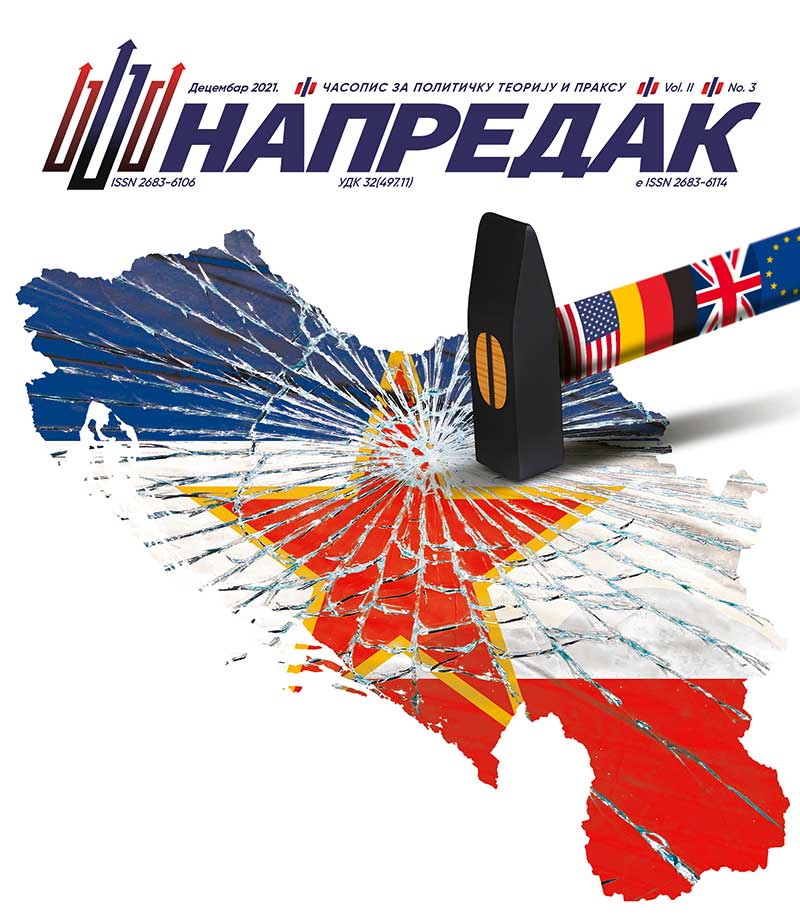Геополитички разлози разбијања Титове Југославије у контексту међународне хегемоније САД
Sažetak
У раду ћемо изнети главне геополитичке разлоге за стварање Краљевине СХС – Југославије,
и пратити њихово дејство до момента када су ти исти разлози, али сада у супротном смеру, довели
до одлуке неоатлантиста да Брозова СФРЈ буде ликвидирана као државна творевина и геополитички
пројект сила Антанте. Процес разбијања СФРЈ ишао је брзо и одлучно, уз наметање нових геополитичких интереса неоатлантизма и спољнополитичких приоритета тада новог хегемона у монополарном политичком поретку, управо насталом након рушења биполаризма, који је светском сценом доминирао више од четири деценије. Сви назначени процеси дешавали су се у фази акцелиране геополитичке трансгресије САД како у зонама постсовјетског поретка моћи, тако и на територијалном ареалу постјугословенског геополитичког експеримента, узрокујући свеукупно државно, демографско, територијално, идентитетско, језичко-културно и економско сакаћење Срба на том простору.
Reference
Avramov, S. (1998). The Trilateral Commission. Veternik: Idij. [In Serbian]
Bataković, D. (2018). The Balkan Piedmont: Serbia and the Yugoslav Question. In: The history of a utopia. Belgrade: Catena Mundi. [In Serbian]
Bogetić, D. (2000). Yugoslavia and the West 1952–1955. Belgrade: Službeni list SRJ. [In Serbian]
Despotović, Lj. (2019). The geopolitics of Svetosavlje. Sremski Karlovci: Kairos. [In Serbian]
Despotović, Lj., Glišin, V. (2020). The American militarization of Europe at the beginning of the 21st century as a malignant explication of the continuity of Anglo-Saxon geopolitical doctrine. Politika nacionalne bezbednosti 2/2020. Belgrade: Institut za političke studije. [In Serbian]
Despotović, Lj., Glišin, V. (2021). Contemporary international relations and geopolitics. Sremski Karlovci: Kairos. [In Serbian]
Despotović, Lj., Glišin, V. (2021a). The geopolitical interests and political concepts of the formation of the two Yugoslavias and the reasons for their breakdown. In: D. Antić (ed) Leskovački zbornik LXI. Leskovac: Narodni muzej Leskovac. [In Serbian]
Dešner, K. (2021). The Politics of the Papacy in the 20th Century. Belgrade: Catena Mundi. [In Serbian]
Dević, N. (2021). For the party and Tito: The Partisan movement in Serbia 1941–1944. Belgrade: Službeni glasnik. [In Serbian]
Ekmečić, M. (1989). The Creation of Yugoslavia 1790–1918. Belgrade: Prosveta. [In Serbian]
Ekmečić, M. (2002). Essays from history. Belgrade: Službeni list SRJ. [In Serbian]
Ekmečić, M. (2014). The war goals of Serbia 1914. Belgrade: Filip Višnjić. [In Serbian]
Ekmečić, M. (2017). The long movement between slaughter and plowing – History of the Serbs in the new century (1492–1992). Belgrade: Evro Book. [In Serbian]
Mackinder, H. (1942). Democratic Ideals and Reality. Washington DC: National Defense University Press. [In English]
Mitrović, A. (2018). The war goals of the Central Powers and the Yugoslav question 1914–1918. In: The history of a utopia. Belgrade: Catena Mundi. [In Serbian]
Orel, K. (2012). Central Europe: from idea to history. Belgrade: Clio. [In Serbian]
Proroković, D. (2014). German geopolitics and the Balkans: on the goals of Central European continentalism. Belgrade: Catena Mundi. [In Serbian]
Vudvord, S. (1997). Balkan Tragedy: Chaos and Dissolution after the Cold War. Belgrade: Filip Višnjić. [In Serbian]
Živen, E. (2019). The west wall did not fall. Novi Sad: Nova Evropa. [In Serbian]

